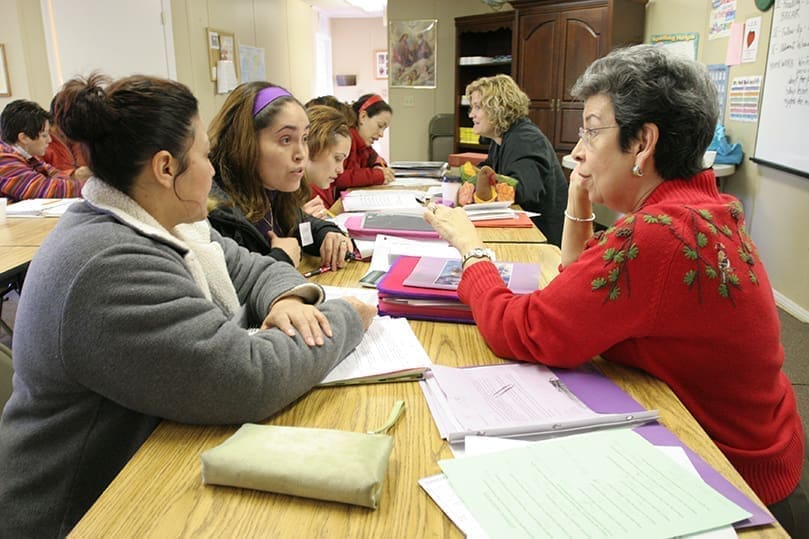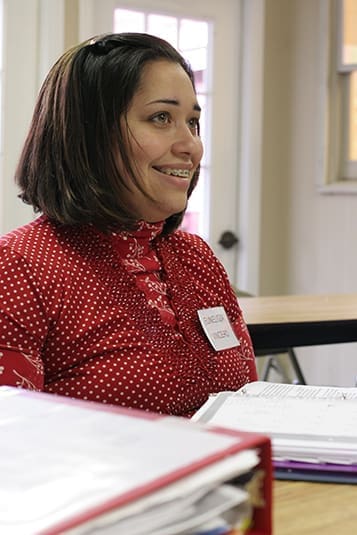 Photo By Michael Alexander
Photo By Michael AlexanderCumming
‘Our Family’ Teaches English, Life Skills In Parish
By ANDREW NELSON, Staff Writer | Published January 7, 2010
The women scribble in three-ring binders as the teacher gently corrects a mispronunciation of the word birth.
“You have to get your tongue out and spit,” says Martha Paris, a former school principal who waves her hands in the air and points to the stumbling student. The students laugh as they coax their uncooperative tongues to make the unfamiliar sound.
It is a Thursday at the intermediate class of Our Family Project, a five-year-old program at St. Brendan the Navigator Church. Its aim is to bridge the gap between Hispanic and English-speaking Catholics by helping assimilate the immigrants.
The Hispanic Center in the back of the church campus is busy five days a week, as some 30 women attend beginner and intermediate programs. The program runs with some 50 volunteers who serve in roles ranging from classroom teachers to one-on-one mentors.
For students, the Our Family Project helps them navigate pitfalls in an unfamiliar community, from understanding the point of turkeys around Thanksgiving to making an appointment at a doctor’s office.
Mexican native Laura Gonzalez, 42, owned a beauty salon in Mexico and does childcare here.
“I am here in the United States. You need to speak English. It is important to take this class,” she said. “I began to speak more and understand more.”
Connie Munoz, 29, said she was born in the United States, but grew up in Mexico and feels she doesn’t speak the language well enough. The mother of two said the program has made her feel more confident.
The most important benefit is helping her kids with schoolwork, she said. And at school conferences, she now relies on her own language skills. “I don’t need a translator. I can understand.”
The Our Family Project grew out of a concern that in the parish the two faith communities were divided by language and didn’t recognize each other.
Kevin Athaide has been with the program since the beginning when it was the brainchild of Sister Joan Daly, a Grey Nun then serving on the parish staff.
“Instead of finding some exotic way of serving them, let’s get back to basics,” he said was the plan. “We are going to work with one family at a time.”

Eunelitza Vincero, a native of Venezuela, smiles after receiving a compliment from the teacher for reading a paragraph in English during the lesson with no mistakes. Photo By Michael Alexander
The project initially met some resistance. People were concerned the group would help illegal immigrants, Athaide said.
His answer? “Up there from heaven, God, our Father, doesn’t see any borders. We are one Catholic Church, these are our brothers and sisters. All we are doing is trying to serve our brothers and sisters,” he said. “We have to be Catholic first, then Latino or non-Latino.”
Athaide is an immigrant himself, which makes him sympathetic to the plight of the Hispanics. He arrived in New York City more than 40 years ago from India as a graduate student. He said he was drawn to this ministry because he recalls the loneliness of being in a foreign country. It wasn’t until he and his wife, Winnie, were taken in by Americans that the loneliness lifted.
Some 60 families so far have benefited from the Our Family Project.
Bill Kelly, the program administrator, said the women helped are soon to be leaders in the church and their neighborhoods.
“They are survivors. They have survived through confusion. They have survived the ups and downs on their jobs,” he said.
The program is so popular that organizers made a tough decision to turn down several women because of limited seating, said Kelly.
“I can speak with other people. They can understand me more,” said Maria Orozco, who joked she was “around 40” and a mother of two. She teaches religion to English speakers. “I am so happy now.”
Eunelitza Vincero, 34, said she was an electrical engineer in her native Venezuela. Her goals include learning English to earn a high school equivalency degree.
“I need the G.E.D. to continue to study, to look for work,” Vincero said.
Meanwhile, she is glad she can help her daughter with school.
“I volunteer at my daughter’s school. The language is a little problem, but I try,” she said.
The ministry involves more than English classes. The project surrounds the students with people and opportunities to be active in the church and civic community.
The group celebrates holidays in both cultures, such as the recent Thanksgiving party, which was previously a mystery to the students. In January, the students will teach others about the Three Kings celebration in Latin cultures.
Weekly, the students have a life skills class. They learn about shopping tips, women’s health issues, how to interact when stopped by the police.
There is a mentoring program, where parishioners check in with the women, as a friend, confidante and counselor.
“It is a job that Jesus Christ would do,” said Rita Lagomasino, 78, who mentors four women.

Mexican natives and Laura Gonzalez, left, and Alicia Orozco listen intently to instructions from their lead teacher Martha Paris. Photo By Michael Alexander
One time, a woman was having a hard time learning English. Lagomasino took her to the doctor where her need for a hearing aid was diagnosed. Once she got a hearing aid, her English skills took off and now she is working in a school, said Lagomasino.
“We improved her life. For me, it is the most wonderful thing I ever did.”
Only women can join the program. Athaide said it was organized to reach women, all Hispanic, because they do not have opportunities to learn the culture. Husbands pick up things on the job, but if women are cut off from learning the language, they have no way to get involved, he said.
“It is the women who stay at home. They are the ones left without jobs and no way to learn English,” he said.
The project now is wrestling with how to graduate people to an advanced course to free up room in the beginner and intermediate levels, he said.
The program works with a lot of volunteers. The only expense is some $2,500 for childcare, which is raised through charities. The parish doesn’t pay for the program.
Supporters see progress in small steps. The parish community is recognizing the Hispanics in the pews, adopting mission statements inclusive of Hispanics. And the women are more involved in civic life. A photo in the Hispanic Center shows nearly two dozen women posing when they planted seedlings as a fundraiser for a drug rehab facility as part of a United Way community service project.
“This has been like yeast that has dropped in flour,” said Kelly.
For information visit www.stbrendansatl.com